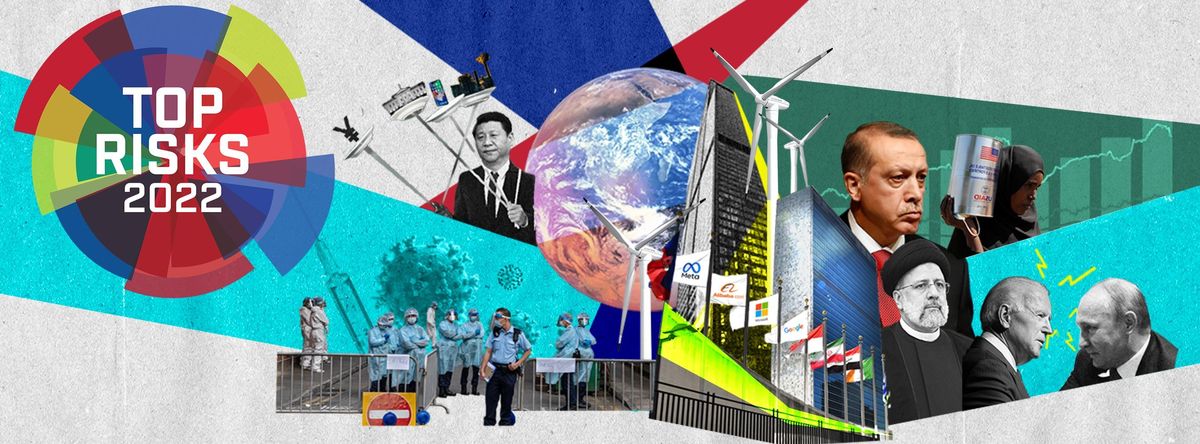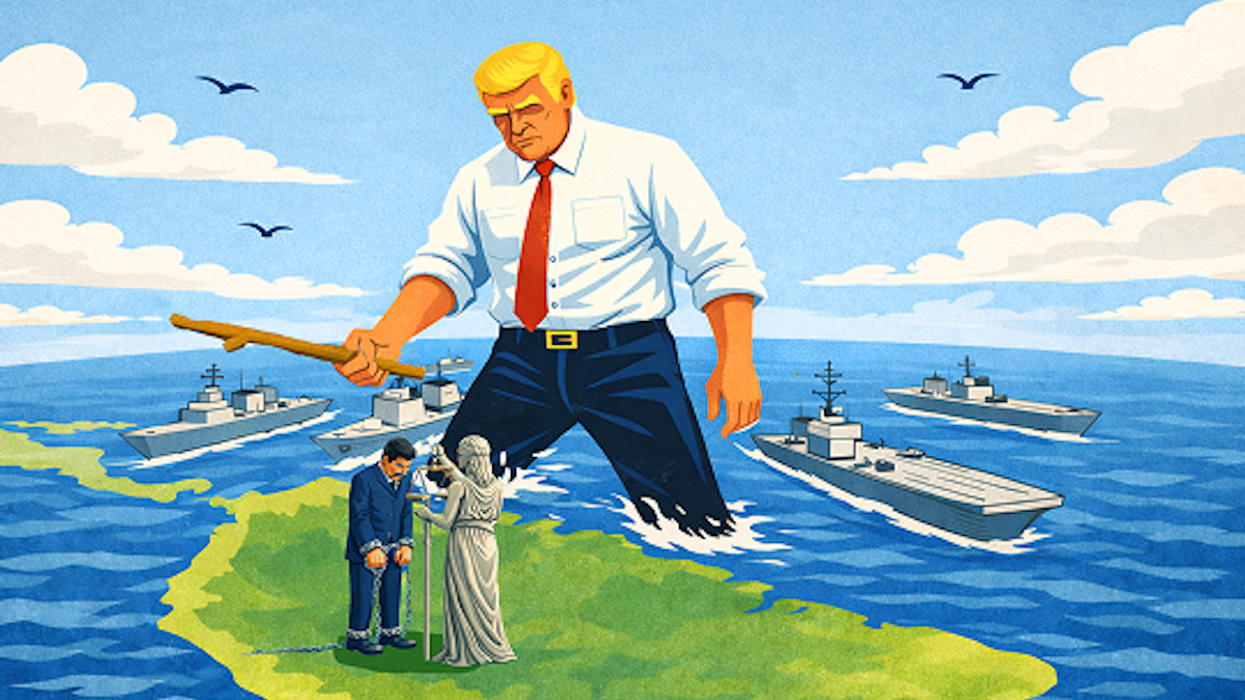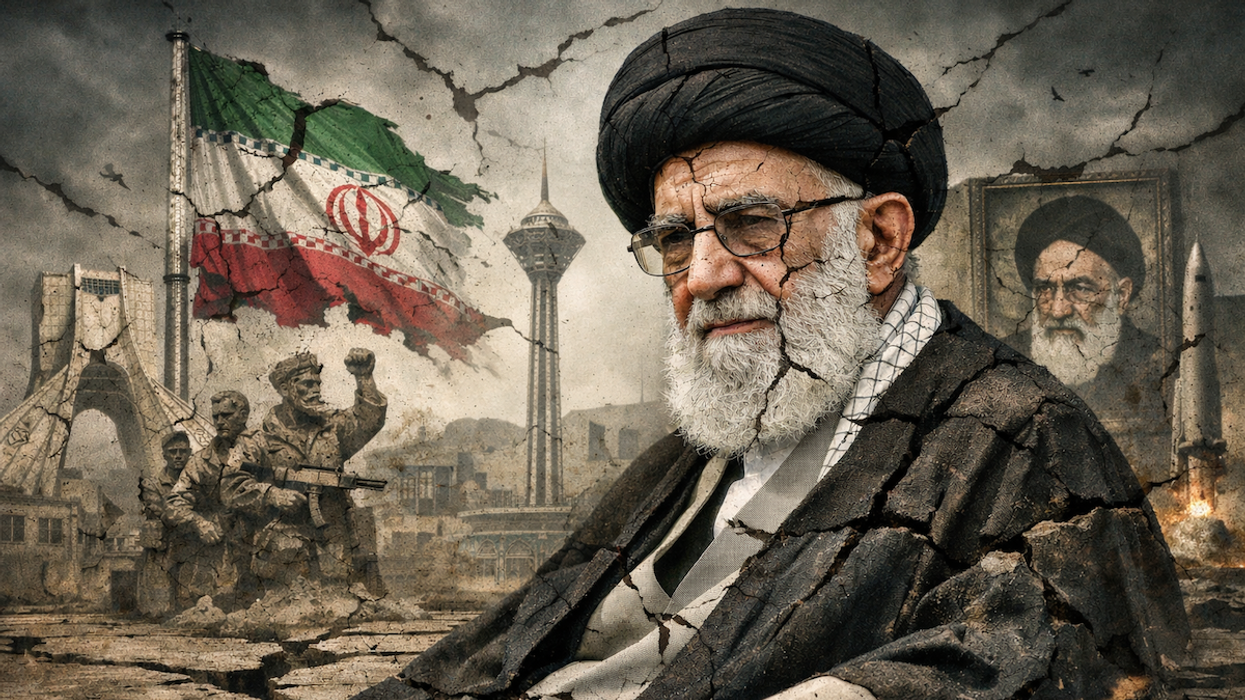As 2022 gets rolling, the US is the world’s most powerful country, but it is also the most politically divided, dysfunctional, and economically unequal of the major wealthy democracies, incapable of addressing even basic problems (infrastructure, health care, you name it). China is the second most powerful country, but after four decades of extraordinary growth, it faces steep hurdles (debt, demographics, inequality…) to keep the momentum going.
As luck would have it, both of the world’s two superpowers are being forced to focus increasingly on domestic issues at the same time. This is a blessing and a curse.
On the one hand, Beijing and Washington’s inward turn lowers the odds of a global war in 2022. On the other hand, it means there will be little global leadership and coordination to respond to global crises like the Covid-19 pandemic and climate change. While in some areas other players—less powerful countries, corporations, civil society—will step into the vacuum left by the retreat of the US and China, not every major void will get filled, leaving some crises to fester and others to blow up.
The growing lack of global leadership that characterizes the G-Zero world dominates Eurasia Group's Top Risks for 2022, summarized below. (Click here for the full report.)
Want to understand the world a little better? Subscribe to GZERO Daily by Ian Bremmer for free and get new posts delivered to your inbox every week.
#1. No Zero Covid
We’re done with the pandemic, but it’s not yet done with us, and the finish line depends on where you live. Critically, China’s zero-Covid policy will fail.
For rich countries, the end is nearing as the virus collides with highly vaccinated populations and treatments that prevent death. But most countries, and particularly China, will have a harder time getting there. China’s “Zero Covid” policy, which looked incredibly successful in 2020, is now fighting against a much more transmissible variant with vaccines that are only marginally effective and with fewer people protected by previous infection. China’s “Zero Covid” policy will fail to contain infections in 2022 and will lead to larger outbreaks and more severe lockdowns, and greater economic disruptions in a nation that has long been the world’s primary engine for growth.
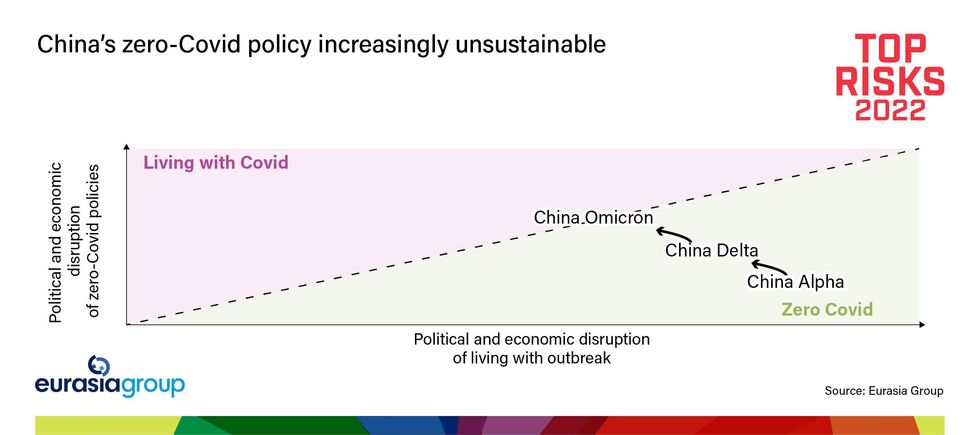 China's zero-Covid policy increasingly unsustainableEurasia Group
China's zero-Covid policy increasingly unsustainableEurasia Group
In general, poorer countries will be hit hardest, and political incumbents will bear the brunt of public anger. Demand for booster shots in wealthier countries will prevent effective vaccines from becoming more widely available. New outbreaks will slow economic growth in emerging markets and leave poorer governments with more debt.
In all these ways, Covid-19 will continue to drive political and economic instability.
#2. Technopolar world
Today, the world’s biggest tech firms decide much of what we see and hear. They determine our economic opportunities and shape our opinions on important subjects. EU, US, and Chinese policymakers will all tighten tech regulation this year, but they won’t limit their ability to invest in the digital sphere where they, not governments, remain the primary architects, actors, and enforcers.
Tech giants can’t yet (and don’t want to) effectively govern the digital space or the tools they’re creating. Disinformation will further undermine public faith in democracy, particularly in the US. As tech firms and governments fail to agree on how to protect data privacy, cyber-security, and the safe and ethical use of artificial intelligence, US-China (and, to a lesser degree, US-Europe) tensions on these issues will grow.
#3. US midterms
In November, Republicans will almost certainly win back majority control of the House of Representatives—and maybe the Senate. If so, Democrats will view GOP control as the illegitimate result of a voter-suppression campaign, and Republicans will see victory as further evidence of 2020 election fraud. Biden’s impeachment will lead the GOP agenda and public trust in American political institutions will take an even larger hit.
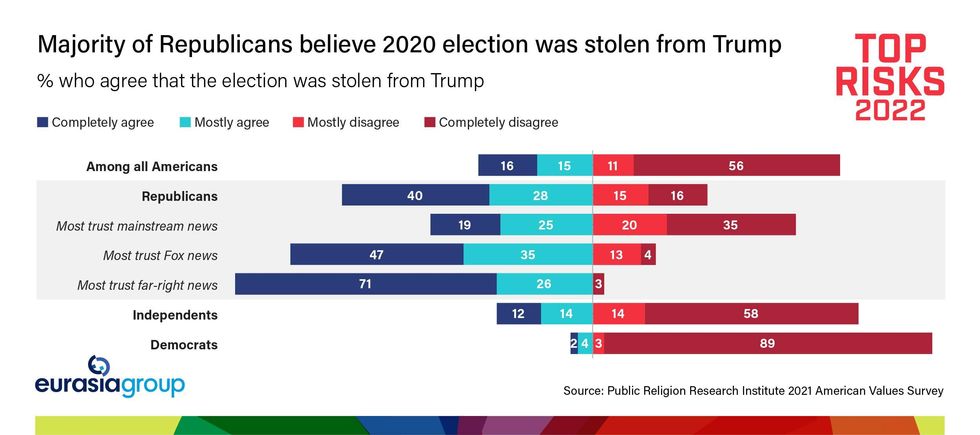 Majority of Republicans believe 2020 election was stolen from TrumpPublic Religion Research Institute 2021 American Values Survey
Majority of Republicans believe 2020 election was stolen from TrumpPublic Religion Research Institute 2021 American Values Survey
More important is what the midterms mean for the 2024 presidential election. Donald Trump is signaling he will run for president in 2024. If he is defeated by a Democrat, a Republican House could vote to overturn state-level election results, but a Democrat-controlled Senate would limit the fallout.
But if Republicans win both the House and Senate this November, if Trump responds to possible defeat in 2024 by challenging the result, and if state-level officials submit alternative certifications that Republican congressional majorities accept, the 2024 US presidential election can be broken and a constitutional crisis will result.
#4. China at home
An increasingly burdensome “zero-COVID policy” (see Risk #1) and President Xi Jinping’s reform plans will unsettle markets and companies in 2022. Xi’s vision of technological self-sufficiency, economic security, and social harmony—to “make China strong”—will collide with intensifying pushback from the West, an exhausted growth model, an overleveraged and unbalanced economy, and a rapidly aging population—and at a time when COVID variants continue to circulate.
#5. Russia
A buildup of Russian troops near Ukraine has opened a broader confrontation over Europe’s security architecture. President Putin could send in troops and annex the occupied Donbas, but his current demand is for major NATO security concessions and a promise of no further eastward expansion. But a grand bargain is unlikely, and close encounters between NATO and Russian ships and planes will become more frequent and more dangerous, increasing chances of an accident. Add ongoing concerns about Russian cyber-attacks and interference in US elections. Possible US sanctions that target the secondary market trading of Russian sovereign debt would end any hopes of more stable US-Russian relations.
#6. Iran
Iran’s nuclear program is advancing rapidly. With diplomacy stalled, the Biden administration has few options. Israel will increasingly take matters into its own hands—which once again raises the specter of Israeli strikes on Iranian nuclear facilities. These pressures will collide this year, leaving oil prices and regional states jittery, and increasing the risk of conflict.
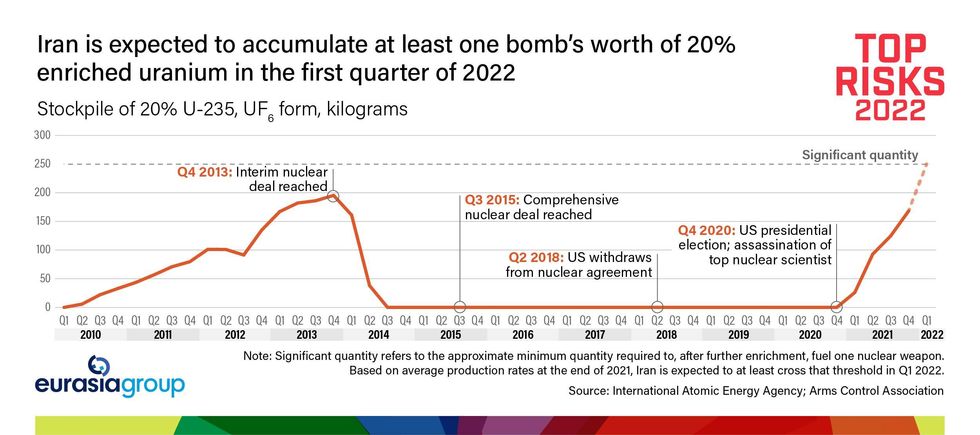
#7. Two steps greener, one step back
In 2022, continued upward pressure on energy costs will force governments to favor policies that lower energy costs but delay climate action. Rising energy prices will raise anxiety levels for both voters and elected officials—even as climate pressures on government increase.
#8. Empty lands
With Washington and Beijing distracted by domestic priorities, and the EU, UK, and Japan unable to fill the resulting power vacuum, many countries and regions will be left with unmanaged crises. In Afghanistan, a disorganized and inexperienced Taliban will struggle to stop Islamic State from drawing foreign militants into ungoverned expanses of the country. The risk of terrorism also remains acute in the thinly governed Sahel. Civil wars will create new risks in Yemen, Myanmar, and Ethiopia. Venezuela and Haiti risk growing refugee crises.
#9. Corporates losing the culture wars
The world’s biggest brands look forward to record profits but a more difficult year managing politics. Consumers and employees, empowered by “cancel culture” and enabled by social media, will make new demands on multinational corporations and the governments that regulate them. Multinationals will spend more time and money navigating environmental, cultural, social, and political minefields.
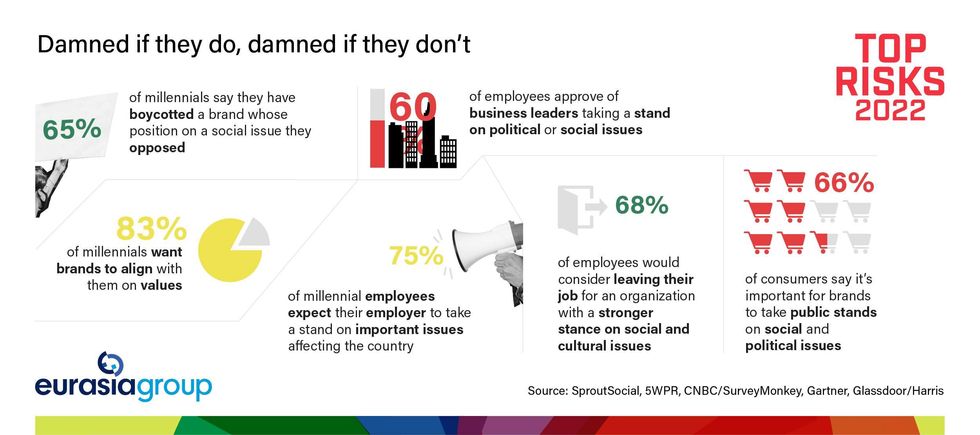 Damned if they do, damned if they don'tSproutSocial, 5WPR, CNBC/SurveyMonkey, Gartner, Glassdoor/Harris
Damned if they do, damned if they don'tSproutSocial, 5WPR, CNBC/SurveyMonkey, Gartner, Glassdoor/Harris
#10. Turkey
President Erdogan will drag Turkey’s economy and international standing to new lows in 2022 as he tries to reverse his plunging poll numbers ahead of elections in 2023. Unemployment and inflation are high, and the lira is weaker and more volatile, but Erdogan has rejected orthodox economic management. His foreign policy will grow more combative this year to distract voters from the economic crisis. In the unlikely event of early elections in 2022, all these risks will be exacerbated.
Red herrings
These are issues that a lot of pundits and even serious analysts identify as top risks but that we at Eurasia Group believe either will not materialize or will not be major sources of geopolitical instability in 2022:
- The US and China each will be too busy with challenges at home to wage Cold War 2.0, and risks of a confrontation over Taiwan are exaggerated.
- The presidential faceoff between Jair Bolsonaro and Luiz Inacio Lula de Silva will test but not undermine Brazil’s democratic institutions.
- More Middle East migrants will reach EU territory in 2022, but there will be no repeat of the 2015-16 crisis this year.
Tune in to gzeromedia.com/toprisks on Monday 1/3 at 1 pm ET and watch me discuss the report live with Eurasia Group's Cliff Kupchan and Shari Friedman. We'll be taking questions!
🔔 And if you haven't already, don't forget to subscribe to my free newsletter, GZERO Daily by Ian Bremmer, to get new posts delivered to your inbox.
